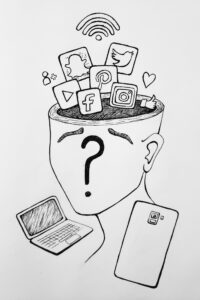Social media is sadly making us anti-social

The average teenager spends about nine hours a day staring at a screen.
That’s more than one-third of a day. Considering people sleep a good chunk of the night too, the amount of time teens spend during their time awake looking at a screen is embarrassing.
Much of that time could be watching TV, or streaming Netflix from a laptop, or online shopping. There are many different types of media that young people are consuming.
But the one type of media sticks out in my eyes: social media.
I’ve always thought social media is a blessing, but it’s also a huge curse. It keeps becoming more of a curse the more it becomes a part of people’s lives.
What’s more concerning is that “tweens,” ages 8-12, are staring at a screen nearly six hours a day.
Imagine being 8-years-old and you’re looking at your phone, iPad, laptop, or TV for a quarter of the day.
That’s sad.
I don’t know about you, but when I was that age, I was outside riding a bike, playing Wiffle Ball, basically anything that required running around and expending my childhood energy.
Now, I see kids who look like they’re barely in elementary school and they have a cell phone. Many times, it’s not just any cell phone, it’s one of the newer iPhones. A smart phone.
So, from a very young age, kids are glued to their screens. They don’t get outside, they have much less in-person communication with their peers, and they see a LOT of media.
This is causing a lot of problems. To the point where I believe something needs to be done.
It appears that as soon as technology and social media boomed, it was also the time we started to see mental health become a bigger and bigger issue.
In my eyes, anxiety and depression is a lot more common than it used to be. Anytime I ask people if they agree, they always do.
I strongly believe that the new technologies and social media are big risk factors or even a major direct cause of anxiety and depression.
I mean, think about it, if kids start staring at their screens all day, first off, they’re not getting outside at all. They’re not going out and playing with friends every day, scraping their knees and bickering.
That’s an issue in and of itself in terms of childhood obesity. Kids are not getting the exercise they need growing up.
They’re also not getting the social interaction they should be getting. From younger ages, kids start communicating with their peers over text, and the worst possible thing, social media.
Social media is a place where people can say whatever they want to anyone behind the comfort of their own screen, not directly to the other person’s face. We’ve seen a completely new form of bullying come along with social media in cyberbullying.
On top of that, body image becomes an issue. People see tons of images of the “ideal” body type that society has imposed on people, making plenty of people self-conscious of their own bodies.
Furthermore, younger people have begun to compare themselves to their peers. They base their levels of popularity on the number of likes they get, or the number of followers or friends they have, constantly trying to get higher numbers to outdo others.
And it even comes down to misinterpreting tones of certain messages from social media posts. People all always afraid that their peers are being passive aggressive in their posts, making us worry about whether a certain post was directed at us.
And what do people do as they lay in bed at night before falling asleep? Stare at their phones. This causes people to have a harder time falling asleep, and sleep is super important to well-being.
It’s pretty clear that social media is a problem. In fact, it’s definitely safe to say that it’s addicting.
Think about it. We’ve seen many people try to take a “cleanse” from social media, yet they always come back to it. This to me is a more optimistic way of saying they failed to quit their addiction.
I certainly feel addicted, myself. I’ve tried numerous times to claw away from my phone, yet I always end up reactivating my accounts.
The crazy part about this is it seems like every person who does take a cleanse from social media absolutely loves it. They always feel happier. So why do they always end up turning back to their screen?
They’re addicted.
This has completely changed the way we live. It seems like everyone’s always stressed. We’re easily offended. Some are absolutely miserable.
No one is social anymore. When you walk by someone on campus, people don’t even say hi. Every day I walk by people, and every time I try to make eye contact and just smile or say hello, and about 90% of the time I’m welcomed with someone either staring into the ground or their phone. It’s really sad.
No one knows how to have face-to-face interactions because we always talk behind the comfort of our screens.
Now, we see more and more people dealing with mental health issues. I’m sure that not everyone has anxiety or depression due to social media, but it appears that many cases can be connected to that.
It’s time that we do something. Life seemed so much better and simpler when we all weren’t glued to a screen. Get outside. Talk to people. Just smile.
You never know what you could be missing when you’re staring at the screen. The impact it could have on you mentally could be dangerous.
The thing is, I bet many of you reading this will agree with what I’m saying, yet we will do nothing about it. It’s a problem that needs to be addressed.
But what would we do without phones?
Some people can’t get away from it for more than a day.
We’re in trouble.
– Brendan Crowley


